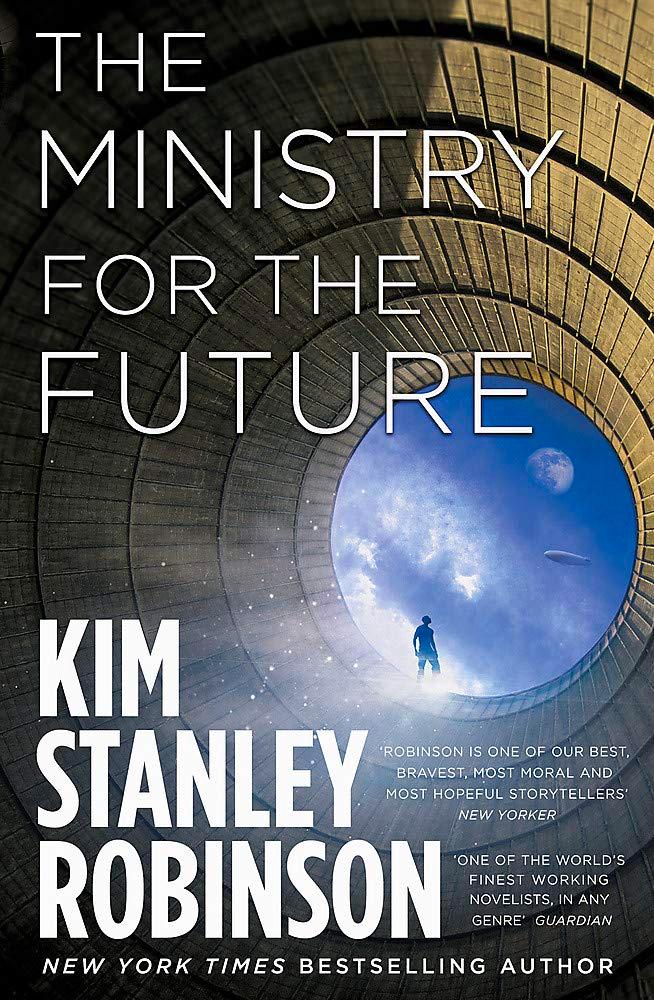
3 minute read
Narrative approaches
The Ministry for the Future, Kim Stanley Robinson
Climate Fiction
Advertisement
Climate fiction (sometimes shortened as cli-fi) is literature that deals with climate change and global warming. Not necessarily speculative in nature, works may take place in the world as we know it or in the near future. The genre frequently includes science fiction and dystopian or utopian themes, imagining the potential futures based on how humanity responds to the challenges created by climate change. Technologies such as climate engineering or climate adaptation practices often feature prominently in works exploring their impacts on society.
The Ministry for the Future, Kim Stanley Robinson
The Ministry for the Future is a novel by American science fiction writer Kim Stanley Robinson published in 2020. Set in the near future, the novel follows a subsidiary body, established under the Paris Agreement, whose mission is to advocate for the world’s future generations of citizens as if their rights are as valid as the present generation’s. With its emphasis on scientific accuracy and non-fiction descriptions of history and social science, the novel is classified as hard science fiction. It is also a part of the growing body of climate fiction. Robinson had previously written other climate fiction novels, such as 2312 and New York 2140. The novel also includes elements of utopian fiction as it portrays society addressing a problem and elements of horror fiction as climate change threatens characters.

The Ministry for the Future, Kim Stanley Robinson
After Geoengineering: Climate Tragedy, Repair, and Restoration, Holly Jean Buck
After Geoengineering presents a series of possible futures. The window for action on climate change is closing rapidly. We are hurtling ever faster towards climate catastrophe—the destruction of a habitable world for many species, perhaps the near-extinction of our own. As anxieties about global temperatures soar, demands for urgent action grow louder. Some are thinking about releasing aerosols into the stratosphere in order to reflect sunlight back into space and cool the earth. And this may be necessary, if it actually works. But it would only be the beginning; it’s what comes after that counts.
In this groundbreaking book, Holly Jean Buck charts a possible course to a liveable future. Climate restoration will require not just innovative technologies to remove carbon from the atmosphere, but social and economic transformation. Looking at industrial-scale seaweed farms, the grinding of rocks to sequester carbon at the bottom of the sea, the restoration of wetlands, and reforestation, Buck examines possible methods for such transformations and meets the people developing them.

Playing Nature: Ecology in Video Games, Alenda Y. Chang
Video games may be fun and immersive diversions from daily life, but can they go beyond the realm of entertainment to do something serious--like help us save the planet? As one of the signature issues of the twenty-first century, ecological deterioration is seemingly everywhere, but it is rarely considered via the realm of interactive digital play. In Playing Nature, Alenda Y. Chang offers groundbreaking methods for exploring this vital overlap.
Arguing that games need to be understood as part of a cultural response to the growing ecological crisis, Playing Nature seeds conversations around key environmental science concepts and terms. Chang suggests several ways to rethink existing game taxonomies and theories of agency while revealing surprising fundamental similarities between game play and scientific work.
Gracefully reconciling new media theory with environmental criticism, Playing Nature examines an exciting range of games and related art forms, including historical and contemporary analog and digital games, alternate- and augmented-reality games, museum exhibitions, film, and science fiction. Chang puts her surprising ideas into conversation with leading media studies and environmental humanities scholars like Alexander










